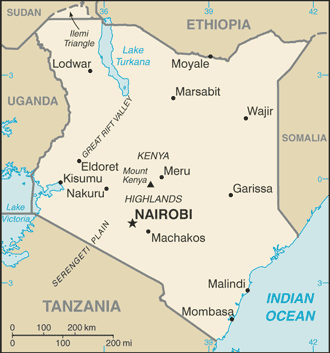Kenya

The Republic of Kenya has an estimated population of 40.8 million (UN, 2010). The capital is Nairobi. Kenya has an area of 582,647 sq km (224,961 sq miles). The main languages are Swahili, and English.
Kenya gained its independence in 1963 from Britain. The country was then dominated by the ruling Kenyan African National Union (KANU) until 2002 when multi party elections took place. Kenya’s reputation for stability was shaken by the 2007 presidential election when communal violence erupted over claims that the election was rigged. The violent conflicts led to the death of as many as 1,500 people.
Although women form more than half of the population, they are grossly under-represented in leadership and decisions making positions in Kenya. Violence against women is a serious problem in Kenya, with one woman being raped every 30 seconds. Gender-based violence includes assault, rape, sexual harassment, domestic violence, emotional abuse and female genital mutilation.
- Kenya signed the Protocol to the African Charter on Human and Peoples' Rights on the Rights of Women in Africa (The Maputo Protocol) on the 17th of December 2003 but has not ratified it.
- The Convention on the Elimination of All Forms of Discrimination against Women (CEDAW) was ratified by Kenya on the 9th of March 1984.
- Kenya has not yet adopted a National Action Plan on United Nations Security Council Resolution 1325 (UNSCR 1325).
- There are no current or former UN peacekeeping mandates in Kenya.
Source: BBC, AlertNet, CIA, UN, SIGI,
